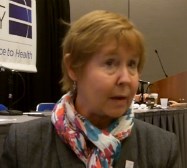User login
SAN DIEGO – As prescriptions for less-regulated, custom-compounded menopausal hormones approach the number of prescriptions for FDA-approved hormones, Dr. JoAnn Pinkerton says that clinicians should educate patients on the differences between the hormones.
In an interview at the meeting of the Endocrine Society, Dr. Pinkerton, professor of obstetrics and gynecology at the University of Virginia Health System, Charlottesville, framed her remarks in light of findings from a recent survey of 483 pharmacists, which found that an estimated 26-33 million prescriptions for compounded, non–FDA-approved menopausal therapies are filled in the United States each year.
Dr. Pinkerton disclosed that she has received grants and research support (paid to the University of Virginia) from Pfizer, Inc., TherapeuticsMD, Noven, Shionogi, and TXMD.
The video associated with this article is no longer available on this site. Please view all of our videos on the MDedge YouTube channel
SAN DIEGO – As prescriptions for less-regulated, custom-compounded menopausal hormones approach the number of prescriptions for FDA-approved hormones, Dr. JoAnn Pinkerton says that clinicians should educate patients on the differences between the hormones.
In an interview at the meeting of the Endocrine Society, Dr. Pinkerton, professor of obstetrics and gynecology at the University of Virginia Health System, Charlottesville, framed her remarks in light of findings from a recent survey of 483 pharmacists, which found that an estimated 26-33 million prescriptions for compounded, non–FDA-approved menopausal therapies are filled in the United States each year.
Dr. Pinkerton disclosed that she has received grants and research support (paid to the University of Virginia) from Pfizer, Inc., TherapeuticsMD, Noven, Shionogi, and TXMD.
The video associated with this article is no longer available on this site. Please view all of our videos on the MDedge YouTube channel
SAN DIEGO – As prescriptions for less-regulated, custom-compounded menopausal hormones approach the number of prescriptions for FDA-approved hormones, Dr. JoAnn Pinkerton says that clinicians should educate patients on the differences between the hormones.
In an interview at the meeting of the Endocrine Society, Dr. Pinkerton, professor of obstetrics and gynecology at the University of Virginia Health System, Charlottesville, framed her remarks in light of findings from a recent survey of 483 pharmacists, which found that an estimated 26-33 million prescriptions for compounded, non–FDA-approved menopausal therapies are filled in the United States each year.
Dr. Pinkerton disclosed that she has received grants and research support (paid to the University of Virginia) from Pfizer, Inc., TherapeuticsMD, Noven, Shionogi, and TXMD.
The video associated with this article is no longer available on this site. Please view all of our videos on the MDedge YouTube channel
AT ENDO 2015
